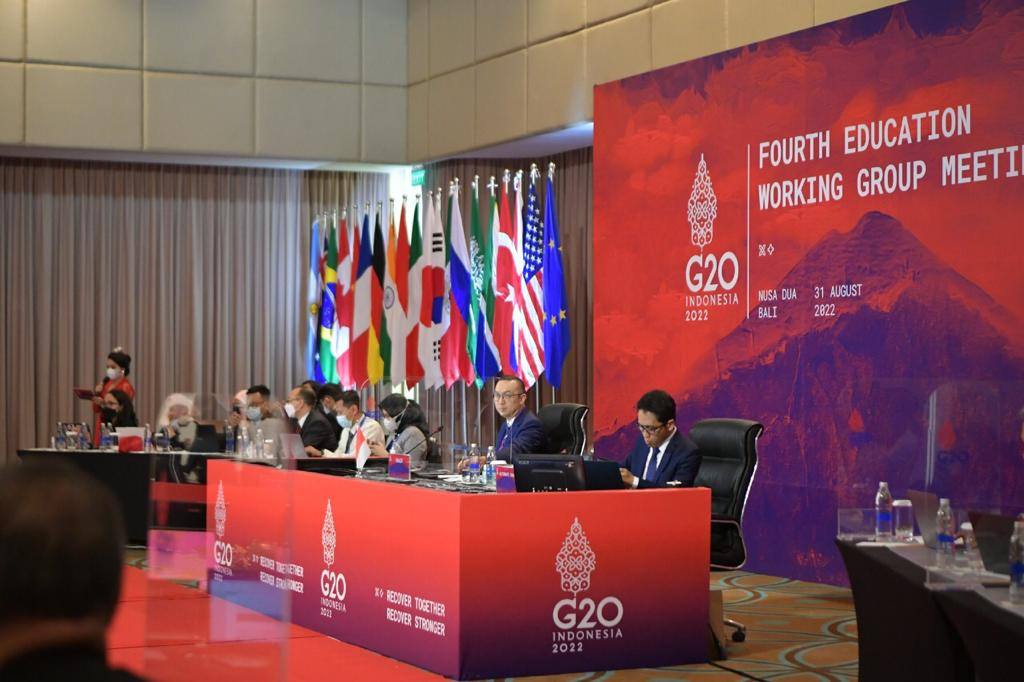Popular Reads
Top Results
Can't find what you're looking for?
View all search resultsPopular Reads
Top Results
Can't find what you're looking for?
View all search results‘Gotong royong’ for global education recovery
The spirit of gotong royong (mutual cooperation) resounded during the Education Working Group and Education Ministers’ Meetings in Bali from Aug. 31 to Sept. 1. Seizing the momentum of the Education Ministers’ Meeting (EdMM).
Change text size
Gift Premium Articles
to Anyone
T
he spirit of gotong royong (mutual cooperation) resounded during the Education Working Group and Education Ministers’ Meetings in Bali from Aug. 31 to Sept. 1. Seizing the momentum of the Education Ministers’ Meeting (EdMM), Indonesia’s Group of 20 Presidency reemphasized the long-term commitment of G20 countries to working together to help the global education sector recover and achieving equality in education.
Education, Culture, Research and Technology Minister Nadiem Anwar Makarim expressed his appreciation for all member countries for their valuable contributions in preparing the deliverables of the Education Working Group (EdWG) since March.
"We also thank international organizations for their advice and suggestions in the achievement of the Education Working Group objectives," said Nadiem.
The MoECRT, along with G20 member countries, special invitees and international organizations, has produced a report with a compendium as the deliverables of the Education Working Group. The documents present the mapping of challenges and various strategies, as well as best practices from 26 countries, with more than 150 education priority programs.
Stefania Giannini, UNESCO assistant director-general for education, expressed her appreciation of the Indonesian presidency for its leadership over the past year.
“We worked together across nations and cultures in the true spirit of gotong royong, and this is the only way to work in a world facing daunting collective challenges that require urgent solidarity and partnership to reimagine our futures together. This is also the role and responsibility of the G20 group as leading countries and agents of change,” said Stefania.
Minister Nadiem added, “the EdWG series produced a report and the compendium, which are highly important documents in our efforts to promote recovery, strengthen and transform the global education system. These two documents reflect best practices, goals to achieve and dreams of a better future for us all together.”
Besides the report and its accompanying compendium, the MoECRT had also succeeded in uniting voices among G20 countries to restore and reimagine the education sector as described in the chair's summary. This summary was presented by minister Nadiem during the G20 EdMM. Officials from the Foreign Ministry also actively contributed to the negotiation processes of the EdWG/ EdMM meetings.
The deliverables of the G20 EdWG are the result of agreement among delegates in showing their solid commitment to achieving quality education. Moving forward, these deliverables may support other countries in designing and implementing stronger and resilient education policies aimed at tackling learning loss brought about by the pandemic to work toward the achievement of universal quality education by 2030.
G20 member countries also reaffirmed their commitment to promoting knowledge sharing in the effort to address diverse challenges in the education sector in line with the four priority issues of the 2022 G20 EdWG, namely universal quality education, digital technology in education, solidarity and partnerships and the future of work post-COVID-19.
Furthermore, the deliverables of the G20 EdWG also highlight the important role of global commitments in transforming the education sector in line with the United Nations’ commitments. This is the commitment in integrating approaches, learning resources and other methods in education policies and practices.
The MoECRT and G20 member countries are also committed to promoting lifelong learning and acquisition of relevant knowledge, skills and attitudes by all learners. Such commitment is made in an effort to enable all learners to thrive in their lives and work and contribute to the creation of a more equitable, inclusive and sustainable society.
The day’s meeting, added Nadiem, was part of the MoECRT’s real action as leader of the education sector to address the four priorities of the EdWG discussed since the first meeting in early 2022.
“It is imperative for us as leaders to work together in realizing a better future for all children, at all levels, in all countries,” said Nadiem.
“We will together achieve this lofty goal by ensuring equal access to quality education, utilizing digital technologies to accelerate improvements in education practice, increasing the effectiveness of school management and, most importantly of all, empowering teachers and students. It is only through pushing forward on all these fronts that our efforts to recover and transform education can succeed in the face of our current difficulties and future challenges,” the minister concluded.










